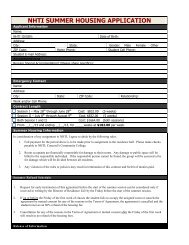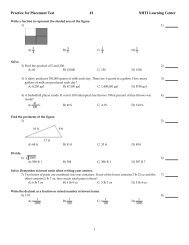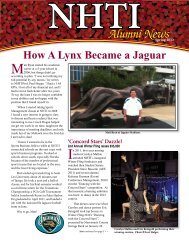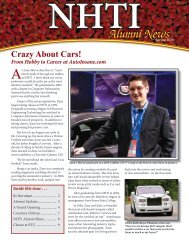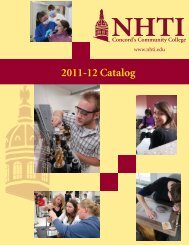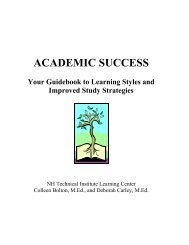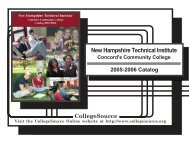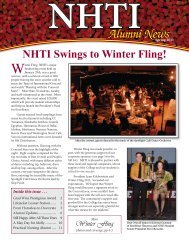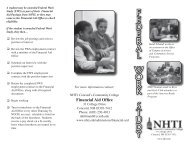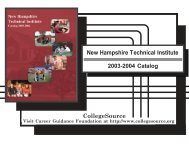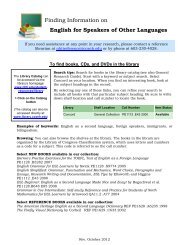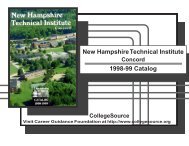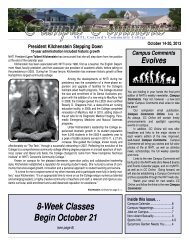Course Descriptions 11-12 - NHTI - Concord's Community College
Course Descriptions 11-12 - NHTI - Concord's Community College
Course Descriptions 11-12 - NHTI - Concord's Community College
- No tags were found...
You also want an ePaper? Increase the reach of your titles
YUMPU automatically turns print PDFs into web optimized ePapers that Google loves.
successful teaching. Supervision is provided by a collegesupervisor and a field-based professional. This courseaddresses specific New Hampshire State Standards forcertification in the following content areas: Biology,Chemistry, General Science, Earth Science, Physical Science,Physics and Professional Education Standards (NH StandardEd 610). (Prerequisite: completion of previous coursework inTECP and permission from the TECP director)TECP 82 Practicum Experience in General Special Education1-15-6This is a field-based course designed to integrate and applyprevious course work in General Special Educationcertification. Students document 240 hours of work in theschools, including referral, observations, teaching,remediation, aiding with transition issues, IEP developmentand implementation, consultation, and designing andimplementing behavioral programs. Seminars meetthroughout the semester. This course addresses specificNew Hampshire State Standards for certification in the areaof general special education. (Prerequisites: acceptance inthe General Special Education Conversion program,completion of previous general special education courseworkand approval from TECP director)Electronic Engineering TechnologyIn addition to listed prerequisites, students must earngrades of "C-" or higher in each course to progress in theprogram.EL 101 Electric Circuits 3-3-4A beginning course in electricity, this course covers basicelectric circuit theory, the nature of electricity, resistance,current and voltage. Detailed coverage of topics includesdirect current, alternating current, Ohm's law, series circuitsand parallel circuits as well as energy and powerrelationships. This course also covers DC circuit analysistechniques including mesh and nodal analysis, and networktheorems such as Norton's, Thevenin's and maximum powertransfer. The transient response of capacitors and inductorsare discussed when a DC voltage is applied using the variouscircuit and analysis techniques. Additional topics include thediscussion of alternating waveform characteristics andanalysis of sinusoidal alternating waveforms. Laboratoryexperiments are designed to reinforce the classroom work.(Co-requisite: MT 133 and EL <strong>11</strong>5 or permission of theDepartment Head of Electronic Engineering Technology)EL 102 Circuit Analysis 3-3-4A continuation of Electric Circuits. This course covers ACcircuit analysis techniques including mesh and nodal analysis,and network theorems such as Norton's, Thevenin's, andmaximum power transfer. Treatment is given to circuitscontaining dependent and independent sources of voltageand current. Resonance and basic filters are covered in detailas well as magnetism. Additional topics covered, as timeallows, are transformers and three-phase circuits. Laboratoryexperiments are designed to reinforce the classroom work.(Prerequisites: EL 101, EN 101, and MT 133; or permission ofdepartment head of Electronic Engineering Technology)EL <strong>11</strong>0 Electronics I 3-3-4This is a study of the physical behavior of electronic devices.Emphasis is on analysis and application of electronic circuitsutilizing semiconductor diodes, operational amplifiers, andtransistors. Topics covered include rectification, clipping andclamping circuits, regulated power supplies, basic op-amps,biasing of transistors, and simplified AC modeling oftransistor circuits. Engineering Design Automation (EDA)tools are used to reinforce the theory through electronicanalysis simulations. Laboratory experimentation reinforcesclassroom theory with practical work. (Prerequisites: EL 101)EL <strong>11</strong>5 Digital Fundamentals 2-3-3Open to all majors, this introductory digital course isdesigned for students with little or no electronics skills.Topics covered include basic logic gates, Base 2, 10, and 16number systems, BCD, Gray and ASCII codes, Booleanalgebra, Karnaugh maps, flip-flops, counters, programmablelogic devices and other related digital devices. Hands-onlaboratory experiments, which augment the learningprocess, are an integral part of this course. The labsdemonstrate real world implementation of otherwiseabstract academic concepts and provide valuable experiencein breadboarding, testing and debugging circuits.(Prerequisite: Algebra I or permission of department head ofElectronic Engineering Technology)EL 144 Embedded Microsystems 3-3-4Personal computers are used to host an integratedhardware/software development system for applicationswith embedded Microcontrollers. A system level approach tothe specification, decomposition, hardware/softwaredevelopment, and system integration for the implementationof embedded systems is covered through lecture andlaboratory experiments. Topics covered includemicroprocessor architecture, instruction sets, interfacing,and real-time programming techniques in assemblylanguage. Laboratory exercises consist of system leveldevelopment in serial and parallel data transfer, dataacquisition, and analog input and output signal processing.(Prerequisites: CP 107, EL 101 and EL <strong>11</strong>5 or permission ofdepartment head of Electronic Engineering Technology)EL 210 Electronics II 3-3-4This course is a continuation of Electronics I covering moreadvanced electronics topics with a variety of applications.The non-ideal characteristics of op-amps and other electronicdevices will be discussed with applications emphasizingoffset, gain and linearity. Other topics may include but arenot limited to: sensors, pulse width modulations, Bode plots,SCRs, TRIACs and optoelectronics. EDA tools are used toreinforce the theory with electronic analysis simulations.(Prerequisites: EL <strong>11</strong>0; corequisite: EL 102 or permission ofthe Department Head of Electronic Engineering Technology)EL 215 Advanced Digital Electronics 3-3-4Advanced topics in digital electronics are covered in thiscourse. These topics include the internal structure of logicfamilies, complex digital circuits, synchronous logic, A/D andD/A conversion, timing diagrams, computer bus systems,programmable logic devices (PLD), and complex circuitdebugging. The topic of digital interfacing is also covered.This includes interfacing various logic families to each other8/17/20<strong>11</strong> <strong>NHTI</strong>, Concord’s <strong>Community</strong> <strong>College</strong> <strong>Course</strong> <strong>Descriptions</strong> 20<strong>11</strong>-20<strong>12</strong> 23



